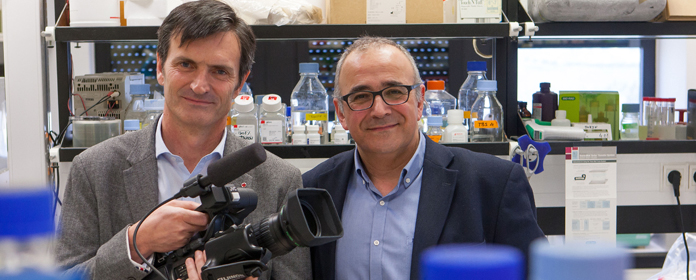The Science Museum of the University of Navarra promotes the first scientific film and video festival in Spain for young people.
The jury of the international #LabMeCrazy Science Film Festival is made up of experts such as Vladimir de Semir

PHOTO: Manuel Castells
The Science Museum of the University of Navarra has launched an international science film festival, the only one of its kind in Spain that is specifically aimed at young people. Under the title #LabMeCrazy Science Film Festival, it aims to bring science closer to this sector of the public.
The festival -open to productions from all over the world- is open to documentaries, reports, short fiction films, programs, TV reports and any video for web or social networks of any subject related to science and whose production is after January 1, 2016. Registration -open until April 28- can be done through the Filmfreeway platform.
All the works submitted will be selected by a preliminary jury - made up of professors and researchers from the University of Navarra - and the finalists in each category will be evaluated by a professional jury that includes experts such as science journalist and director of the Master in Scientific, Medical and Environmental Communication at UPF-IDEC Vladimir de Semir; Bibiana González, director of programming at Discovery Networks Spain and Portugal; Alessandro Griffini, president of IAMS (International Association for Media in Science); and Iván Couso, executive producer of National Geographic Partners, Europe and Africa, among others.
The works will fall into six categories: documentary, report or television production, short fiction film, video for the web or social networks, student production and work produced or co-produced by a university.
The finalist productions will be shown, in screenings open to the whole city, from September 17 to 20 at the Museo Universidad de Navarra, with a subsequent colloquium with their authors. Finally, the awards gala will also take place at the Museum's auditorium on September 20.
In the opinion of Vladimir de Semir, television continues to be the main vehicle for the transmission of knowledge to society, which has been enhanced by social networks: "Through them, the dissemination of the audiovisual world has gone from being a passive way of accessing culture to an active option in which audiences can choose on demand and at any time what they see and what interests them".
"In this context -continues the expert in science communication-, it is very important that what is offered to the public meets the requirements of amenity and rigor indispensable for a good and attractive scientific dissemination. And #LabMeCrazy fits perfectly in the search for these characteristics and qualities".
Bienvenido León, director of the festival and professor of Science Journalism at the School of Communication of the University of Navarra, adds: "About 80% of all data traffic on the Internet is in the form of video. Video has become an essential tool for communicating science to society as a whole. The video camera is nowadays as important for science as a microscope". He also remarks that the festival is aimed, in the first instance, at young people, using simple, clear and fresh language, which is what they use. "It is essential that young people become passionate about science. Ultimately, it depends on this passion that there will be more scientific vocations and that, thanks to them, we will advance as a society", concludes the expert, who has already directed, for 12 years, the documentary film festival Telenatura, which has achieved great international prestige.